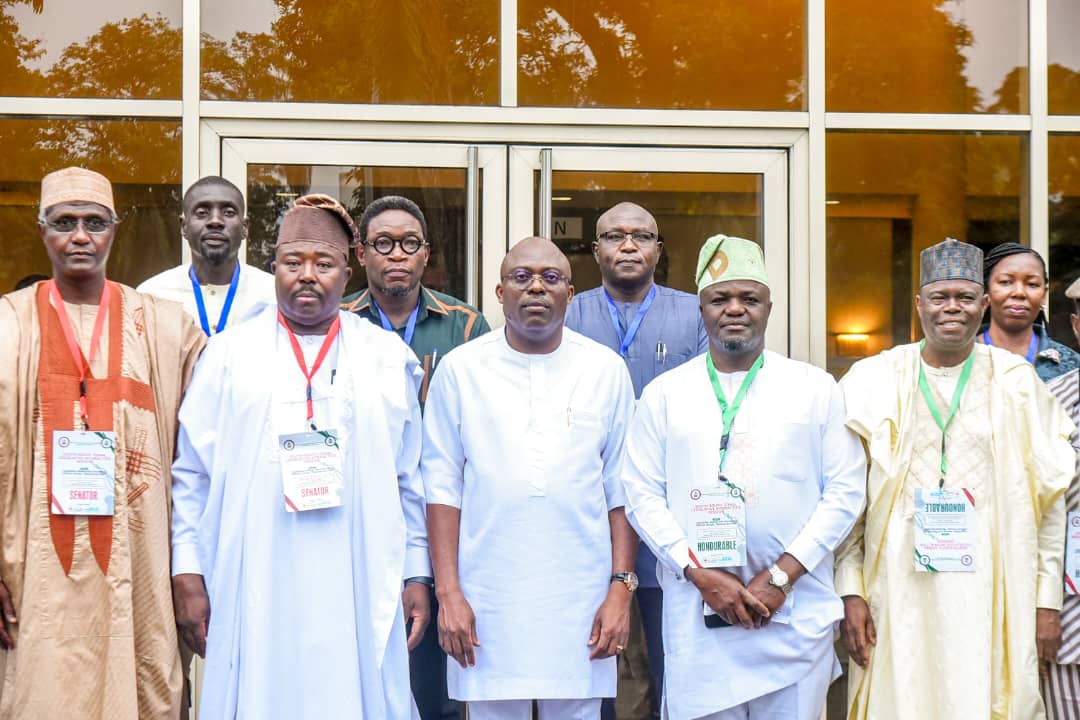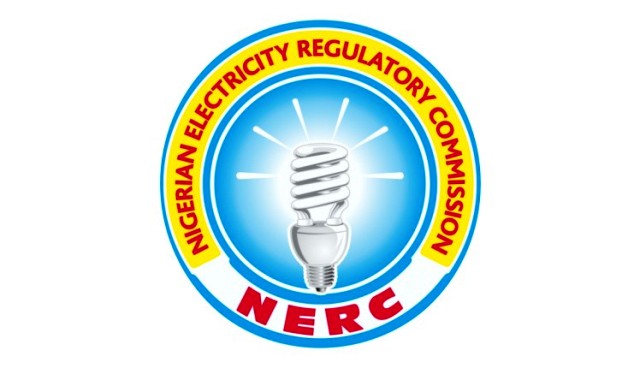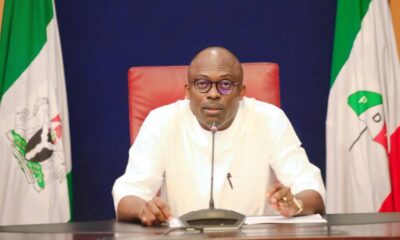Featured
Make Laws To Advance Nigeria, Not Selves, Fubara Tells NASS …Seeks Concerns Of Women, Issues In Difficult Terrains Addressed

Rivers State Governor, Sir Siminalayi Fubara, has challenged the National Assembly Joint Committee on Electoral Matters to focus on amendments that contribute to improving the electoral process in the country for good of society and not to advance individual gains.
The Governor maintained that any legislation targeting to empower or undo particular individual(s) is misplaced, and urged the lawmakers never to pay attention to identified problems it promoted.
Governor Fubara gave the charge when he hosted a delegation of the National Assembly Joint Committee on Electoral Matters, led by its Chairman, Senator Sharafadeen Abiodun Alli and co-Chair, Hon Adebayo Balogun, on courtesy visit to Government House in Port Harcourt, yesterday.
The Governor said: “You are still working on your electoral amendment. I wouldn’t say much on that until when we see your proposal and conduct public hearing where we will make our inputs.
“But, legislate in such a way and manner, knowing full well that tomorrow, you will also sit here (executive). So, don’t do it because you are on the other side. And you say, maybe, let it be at the disadvantage of the people sitting here.
“Do your legislation in such a way and manner that when you sit here, those laws that are made can also apply to you, and you will sit and say, yes, I did the right thing.”
Governor Fubara noted that Nigeria is in a very trying time, and needed to be careful not to make costly mistakes that would erase any good work that has been done in the minds of the people to necessitate a fresh start.
The Governor explained that the level of political awareness and the drive among the people to be involved in the political process is higher now than it was about 20 years ago, and urged the lawmakers to be more sensitive to the realities of the times.
Governor Fubara said: “Everybody now understands that political involvement is the key to a better and developed state. Everybody wants to be part of the system, from the local government to the state and to the Federal Government.
“So, I am happy that we are doing this at this time; and not just doing this but taking the most critical aspect of the election: women. If we are talking about election, it is not the men, the true votes that are counted in elections are women and youths.
“So, taking up this very delicate and sensitive subject to addressing the situation at this time, I think the National Assembly is trying to understand and to feel the pulse of our people.”
Governor Fubara particularly noted how difficult it is to conduct elections in Rivers, Bayelsa, Delta, and Ondo states because most of the communities are riverine and could take more than two days journey to access them on sea amidst the scare of being kidnapped or suffer boat mishap.
Governor Fubara applauded the committee for the courage to take on such sensitive task of embarking on sensitisation of the people and engaging with them on best way to ensure that they enjoyed greater safety during elections.
He said, “I believe that after this committee’s sensitization programme that you are doing, it is going to help us have a framework that will help us get an amendment that will protect the interest of the women, protect elections in difficult terrains.
“Because most times, when elections are conducted, we will wait two days or more before results from different areas will come in. And when they come, at times, these results decide the total picture of the election.
“Considering this now, I believe that you will come out, work out something that will help us solve this difficult problem.
“But, most importantly, to encourage women, give them opportunity more than the 35 percent Affirmative Action, and something that will give them assurance that they should be part of this process.”
Governor Fubara said his administration understands the importance of opportunities when given and what it means to give people opportunities to actualise their aspirations.
The Governor, therefore, assured that whatever the recommendations they make, if they make it public, the Rivers State will be one of the states that will first implement them.
He added, “But, most importantly, we want you to be our ambassadors. You are a visitor to Rivers State today. You have seen us. When you go back, you should also tell them that it is not really those things that you are hearing. Tell them that Rivers State is organised. Tell them that Rivers State is focused, and the leadership is purposeful for the people.”
In his address, the Chairman, National Assembly Joint Committee on Electoral Matters, Senator Sharafadeen Abiodun Alli, said they are in the State for what he described as the second in the series of zonal engagements of the people on the proposed amendment to the Electoral Act, 2022.
Senator Alli stated that there is no doubting the fact that Nigeria has never had an Electoral Act that is as good as the one of 2022, but noted that as soon as the 2023 elections were over, flaws were noticed that needed to be addressed.
He said, “And, I must say without being inmodest, that this is the first time this is happening in the history of the National Assembly. Because we felt that for us, for our people to have confidence in the electoral process, they should be involved in the lawmaking process, and we have decided to go round.”
Senator Alli further said: “About two months ago, we were at Ibadan to talk to the youths and the traditional institutions. Today, we came in here, and it is continuing tomorrow to talk about the issues of legislation: the women and elections in difficult terrains.
“We put this because, apart from the issues of the women and the youths; the South-South, because of the topography of the place (region), it is one of the most difficult terrains we are having difficulties in conducting elections in Nigeria.
“And we need to let the people tell us how the challenges they are facing during elections could be ameliorated in the lawmaking process, hence our coming here,” he added.
He solicited the support of the Government and people of the State and the zone in efforts to fashion a workable electoral amendment that would address the concerns of majority, if not all Nigerians.
Featured
Fubara Tasks New SSG On Honour, Service, Protection Of Rivers Interest

Rivers State Governor, Sir Siminalayi Fubara, has charged the newly appointed Secretary to the State Government (SSG), Barrister Benibo Anabraba, to uphold the dignity of his office, protect the interest of the State, and discharge his duties with honour, respect, and responsibility.
Governor Fubara gave the charge during the swearing-in ceremony of the new SSG, held on Monday at the Executive Council Chambers of Government House, Port Harcourt.
Describing Anabraba’s appointment as an act of divine favour, the Governor said positions of leadership are not attained by our own human effort but by God’s grace in our lives.
“Let me first congratulate you. I’m using the word ‘congratulations’ because a few of us, not by our power but by the special favour of God, find ourselves in exalted positions. It’s not because we are the best, but only by His grace.”
Governor Fubara noted that the Office of the Secretary to the State Government is one of great honour, occupied by only a few since the creation of Rivers State, and urged the new appointee to serve with humility and dedication.
He, however, expressed confidence in Anabraba’s capacity to deliver, citing his past record as a principal officer of the Rivers State House of Assembly.
“This position is a rare privilege. Guard that office with honour. Discharge your duties with respect. Protect the interest of Rivers State. When you leave office, let it be with honour, and that only comes through responsible service.
“I know you’re a dedicated person. This opportunity is not for show or display of power. It’s a call to duty,” he cautioned.
The Governor emphasised that the current administration is focused on restoring confidence of the people because peace has been achieved in the State.
He enjoined the new SSG to align with the vision of the administration and contribute meaningfully to the collective progress of Rivers people.
“We are emerging from a very difficult period and must reassure our people that we mean well for them, especially now that peace has returned to Rivers State. By the grace of God, do your work well. Help us succeed in this assignment that God has given to us,” the Governor added.
Featured
Nigeria’s First Lady Flags Off Renewed Hope Health Initiative In Rivers …Targets Measles, Rubella, HPV Vaccination For Children, Women

The First Lady of the Federal Republic of Nigeria, Senator Oluremi Tinubu, has reiterated her commitment to expanding vaccine coverage nationwide, declaring that the ongoing Measles and Rubella vaccination campaign in Rivers State will surpass all previous records in scope and success.
Speaking through the wife of the Rivers State Governor, Lady Valerie Siminalayi Fubara, Senator Tinubu made this statement during the flag-off ceremony of the Measles, Rubella, and HPV Vaccine Sensitisation Campaign, organised under the Renewed Hope Initiative (RHI) at the Banquet Hall, Government House, Port Harcourt on Monday.
The campaign, implemented by the RHI in collaboration with the Rivers State Primary Healthcare Management Board, C-WINS, and international partners including WHO, UNICEF, Gavi, and Vaccine Alliance, aims to protect millions of children and women from preventable diseases.
“We will leave no stone unturned to ensure that the measles vaccine coverage achieved through this campaign exceeds that of the past,” Senator Tinubu affirmed. “Through technical and financial support, this partnership will ensure that by February, 2026, well-trained staff are deployed across communities to vaccinate all eligible children.”
Rivers State is among the Fourth Stream of Phase One states participating in Africa’s largest-ever health initiative, targeting over 106 million Nigerian children for vaccination against Measles, Rubella, Polio, and HPV. The local rollout is expected to commence in February, 2026, reaching children aged 9 months to 14 years across all 23 local government areas.
Senator Tinubu highlighted the risks of the targeted diseases, describing Measles and Rubella as “highly contagious and potentially deadly,” noting that Rubella can cause severe complications for unborn babies, if contracted by pregnant women.
“The best way to prevent both diseases remains vaccination,” she emphasised.
Narrowing down to efforts by the Rivers State Ministry of Health, the State Primary Healthcare Development Agency, and the State Task Force on Primary Healthcare, led by Deputy Governor, Prof. Ngozi Nma Odu, she noted how instrumental it has been in ensuring comprehensive outreach through an inter-sectoral approach involving education, women affairs, information ministries, traditional and religious leaders, and the security sector.
Senator Tinubu urged parents and caregivers to cooperate fully with health workers.
“The Measles-Rubella vaccine is safe, effective, and free in all our health centres. Please, ensure your children are vaccinated at the right time to protect them from these deadly infections.
“Let us all play our part in spreading awareness. Together, we can safeguard the health and future of our children,” she said, before formally declaring the sensitisation programme open.
In her goodwill message, Deputy Governor, Prof. Ngozi Nma Odu, commended the Renewed Hope Initiative for its sustained impact in Rivers State, noting that the Measles, Rubella, and HPV Sensitisation Programme marks “a significant step in promoting public health awareness, particularly among women and children.”
She highlighted the particular benefit to the girl-child through HPV vaccination, calling it “an investment in their future health and empowerment.”
The Rivers State Coordinator of WHO, Prof. Giwa Abdulganiyu, praised the collaboration between RHI and the State Government, describing the campaign as “a worthy step in the right direction,” and reaffirmed WHO’s continued partnership in achieving health for all.
Earlier, the RHI Rivers State Coordinator, Mrs. Tonye Briggs-Oniyide, welcomed guests, and reaffirmed the initiative’s goal of reducing the incidence of Measles and Rubella in the state.
“These diseases have the potential to cause emergencies and great distress in families. Today’s flag-off represents our collective determination to raise awareness and prevent such tragedies,” she added.
Featured
Workers’ Audits Not Meant For Downsizing – Walson Jack

Mrs Didi Walson-Jack, Head of the Civil Service of the Federation (HCSF), says the ongoing Personnel Audit and Skills Gap Analysis (PASGA) initiative is not aimed at downsizing workers, but aimed at ensuring up-to-date data to reposition the Federal Civil Service.
Walson-Jack stated this in Abuja on Thursday at a sensitisation programme on the PASGA project, organised by the office of HCSF for Permanent Secretaries, Directors and consultants of the initiative.
Represented by Dr Deborah Odoh, Permanent Secretary, Service Policies and Strategies Office, Walson-Jack said the project was designed to strengthen personnel data integrity, align competencies with organisational needs, and promote evidence-based human resource management.
“The unique thing about this exercise is that it is not just a personnel audit but also a skills gap analysis,” she said.
She explained that the project would enable government to have reliable data for effective planning, deployment and decision-making in the civil service.
“Over the years, the Service has grappled with fragmented and outdated personnel information, leading to inefficiencies and misalignments.
“Through PASGA, we are setting a new standard, one that is transparent, data-based, and performance-oriented.
“This reform will deliver accurate personnel records, identify existing skills gaps, and support targeted training and redeployment aligned with the evolving needs of government,” she said.
According to her, the exercise will help assess the competencies of each staff member, identify gaps and plan relevant training to ensure that personnel are properly deployed.
“With this initiative, we will reposition and build capacity across the Service. We have already commenced digital literacy training with National Information Technology Development (NITDA) to enhance staff capacity and efficiency.
“Eventually, there will be no need for downsizing. Instead, we will reposition staff and ensure effective performance,” she said.
Also speaking, Dr Danjuma Kalba, Permanent Secretary, Common Services Office, described PASGA as a major step towards building an efficient, accountable and digitally driven civil service.
According to him, the project aligns with the Federal Civil Service Strategy and Implementation Plan 2025 (FCSSIP25), especially in areas of digitisation, talent management and organisational efficiency.
“As the coordinating ministry and seat of the number one civil servant in Nigeria, the office of the HCSF remains steadfast in leading transformative reforms that uphold professionalism and service excellence,” Kalba said.
Also speaking, Mr Ayo Muritala, Senior Managing Partner, Knewrow Performance Engineering, one of the project’s consultants, said PASGA, also known as Project Phoenix, represents renewal and rebirth in the Federal Civil Service.
“This is more than an audit or data exercise. It is a strategic reform instrument designed to help government understand the people who power the public service.
“It is about data, but beyond data, it is about identity, capability, and national performance,” he said.
The Tide source reports that President Bola Tinubu had earlier directed a comprehensive PASGA across the federal service to enhance professionalism and effective service delivery.
-

 News3 days ago
News3 days agoNERC Approves N28bn For Procurement Of Meters For Band A Customers
-

 News3 days ago
News3 days agoFubara Reassures Rivers People Of Completion Of PH Ring Road Project
-

 Rivers3 days ago
Rivers3 days agoWorld Food Day: Farmers Urge Collaboration For Improved Productivity
-

 Nation3 days ago
Nation3 days agoMOSIEND Hails Benibo Anabraba Appointment As Rivers SSG
-

 Rivers3 days ago
Rivers3 days agoIAUE Governing Council Chair Assures On Mandate Delivery
-

 Featured3 days ago
Featured3 days agoFubara Tasks New SSG On Honour, Service, Protection Of Rivers Interest
-
Opinion3 days ago
Dangers Of Unchecked Growth, Ambition
-

 Editorial3 days ago
Editorial3 days agoMaking Rivers’ Seaports Work





